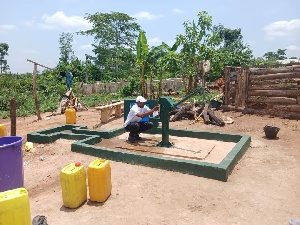Regional News of Saturday, 26 April 2025
Source: www.ghanawebbers.com
KSrelief centre provides clean water to Ghanaian communities
Access to clean drinking water is improving in Ghana. This change comes from a project by the King Salman Humanitarian Aid and Relief Centre (KSrelief).
The centre has drilled 12 out of 14 hand-pump boreholes across the country. This effort aims to solve long-standing water issues in many communities.
Officials report that nine boreholes use hand pumps, while five are solar-powered. Once all 14 are completed, they will benefit around 46,500 people.
The project includes communities like Jamasi, Agona, Atebubu, Ejisu, Kintampo, and Hemang. These areas have struggled daily to access clean water.
In Bipoa Mangoase, a small community in the Ashanti Region, lives have changed. Residents used to walk into the bush for unsafe water.
Adiza Yussifu shared her experience: “Life was hard. We had to boil dirty water before drinking it. But now we have clean water in the community. My family is very happy.”
In Jamasi, people relied on private homes for water during the crisis. However, this option was not always reliable.
Now that a new borehole is available, conditions are improving. Owusu Yeboah Kingsley, an assembly member for Jamasi Estate Electoral Area, expressed gratitude: “The water challenge was serious here. We thank the organization for coming to our aid.”
This project partnered with Markaz Aleawn Alyaqin Humanitarian Service, a local NGO.
Ishmael Mohammed Kamil is the Executive Director of this group. He explained that the project's goal is to help villages struggling with clean water access.
Two years ago, KSrelief built 52 solar-powered boreholes across Ghana. This year’s addition of 14 more shows their ongoing support for vulnerable communities.
“Many places no longer depend on unsafe water because of these boreholes,” Mr. Kamil said. “The project is really making a difference.”
He praised KSrelief's efforts and urged government and traditional leaders to provide land for future projects.
Thanks to KSrelief Centre's work, thousands of Ghanaians now drink clean water near their homes. The hope is that more communities will benefit soon and access to clean water will become a basic right for all.











